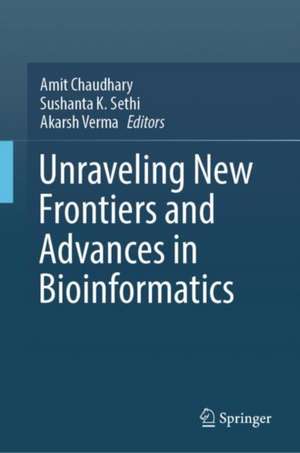Unraveling New Frontiers and Advances in Bioinformatics
Editat de Amit Chaudhary, Sushanta K. Sethi, Akarsh Vermaen Limba Engleză Hardback – 30 oct 2024
This book describes the bioinformatics research field, from its historical roots to the cutting-edge technologies. Many readers can discover the power of next-generation sequencing and genomic data analysis, uncover the secrets of single-cell genomics and transcriptomics, explore the metagenomics and microbiome analysis, and predict the protein structures using structural bioinformatics. Several case studies witnessing the fusion of bioinformatics and artificial intelligence, driving insights from vast biological datasets have also been explored. Other important aspects listed in the book are integrating the omics data for a holistic view of biological systems; experiencing the future of medicine with precision healthcare and personalized treatments; accelerating drug discovery and repurposing through computational approaches; agricultural genomics; and exploring the role of immunoinformatics in designing effective vaccines against infectious diseases.
Preț: 1184.35 lei
Preț vechi: 1480.44 lei
-20% Nou
226.66€ • 235.76$ • 187.12£
Carte tipărită la comandă
Livrare economică 11-17 aprilie
Specificații
ISBN-10: 9819771226
Pagini: 400
Ilustrații: Approx. 400 p. 100 illus., 50 illus. in color.
Dimensiuni: 155 x 235 mm
Ediția:2025
Editura: Springer Nature Singapore
Colecția Springer
Locul publicării:Singapore, Singapore
Cuprins
1. Introduction to Bioinformatics: Past, Present, and Future.- 2. Next-Generation Sequencing and Genomic Data Analysis.- 3. Single-Cell Genomics and Transcriptomics Analysis.- 4. Metagenomics and Microbiome Analysis.- 5. Structural Bioinformatics and Protein Structure Prediction.- 6. Machine Learning and Artificial Intelligence in Bioinformatics.- 7. Integrative Omics and Systems Biology.- 8. Bioinformatics in Precision Medicine and Personalized Healthcare.- 9. Drug Discovery and Repurposing through Bioinformatics.- 10. Bioinformatics in Crop Improvement and Agricultural Genomics.- 11. Immunoinformatics and Vaccine Development.
Notă biografică
Dr. Amit Chaudhary is currently a postdoctoral scholar in the Department of Cell, Developmental, and Integrative Biology at The University of Alabama at Birmingham, AL, 35294-0006, USA. Prior to this, Dr. Chaudhary worked as a postdoctoral fellow in the Polymer Simulation and Characterization Lab in the Department of Metallurgical Engineering and Materials Science at the Indian Institute of Technology Bombay, Mumbai, 400076, India. He completed his Ph.D. in Biotechnology at the Department of Biotechnology, Motilal Nehru National Institute of Technology, Allahabad, 211004, India. Dr. Chaudhary also holds an M.Tech. in Bioinformatics from the Indian Institute of Information Technology, Allahabad, 211015, India, and Bachelor of Pharmacy from the United Institute of Pharmacy, Allahabad, 211008, India. Dr. Chaudhary's research interests span a broad range of topics, including transcriptomics analysis, molecular modeling, molecular docking, molecular dynamics simulations, phylogenetic analysis, protein-protein/gene-gene interaction, and functional and pathways analysis of proteins/genes. He has made notable contributions to the academic field, with approximately 20 research publications in international peer-reviewed SCI journals, international conferences, and book chapters. Additionally, he has significantly contributed to around 10 publications in peer-reviewed journals of repute in areas such as genomics, structural biology, and immunoinformatics. Currently, Dr. Chaudhary is working on two research projects related to single-cell RNA sequencing and the deorphanization of receptors.
Prof. (Dr.) Sushanta Kumar Sethi is currently working as an Assistant Professor in the Department of Mechanical, Materials, and Aerospace Engineering at IIT Dharwad since July 2023. Prior to this, Dr. Sethi worked as a post-doctoral fellow in the Department of Metallurgical Engineering and Materials Science (MEMS) at IIT Bombay. In February 2021, he successfully completed his Ph.D. in the Department of Polymer and Process Engineering at IIT Roorkee. Dr. Sethi holds an M.Tech. from IIT Kharagpur and a B.Tech. from BPUT, Odisha. His research interests encompass various areas such as computational materials science, self-clean coatings, functional nanomaterials/quantum dots and their applications, multi-scale molecular modeling and simulations of polymer materials, development of novel and environmentally sustainable polymer composites and nanocomposites, as well as coatings and adhesives.
Prof. (Dr.) Akarsh Verma is currently working as an assistant professor at the University of Petroleum and Energy Studies (UPES), India. He obtained a Ph.D. in Mechanical Engineering from the Indian Institute of Technology (IIT) Roorkee, India, and did his postdoctoral research work at Osaka University (Japan) and Brigham Young University (USA). He serves the research community by acting as a reviewer for more than 150 International journals (Nature, Elsevier, Springer, Sage, Taylor & Francis, Wiley, IOP, etc.) and has reviewed more than 700 research articles. In addition, he has published more than 80 research articles in high-quality international peer-reviewed journals, 65 book chapters, 7 books, and also presented many research papers at various international/national conferences. His areas of interest are computational mechanics, computational chemistry, quantum mechanics, molecular dynamics, nanocomposites, etc.
Textul de pe ultima copertă
This book describes the bioinformatics research field, from its historical roots to the cutting-edge technologies. Many readers can discover the power of next-generation sequencing and genomic data analysis, uncover the secrets of single-cell genomics and transcriptomics, explore the metagenomics and microbiome analysis, and predict the protein structures using structural bioinformatics. Several case studies witnessing the fusion of bioinformatics and artificial intelligence, driving insights from vast biological datasets have also been explored. Other important aspects listed in the book are integrating the omics data for a holistic view of biological systems; experiencing the future of medicine with precision healthcare and personalized treatments; accelerating drug discovery and repurposing through computational approaches; agricultural genomics; and exploring the role of immunoinformatics in designing effective vaccines against infectious diseases.
